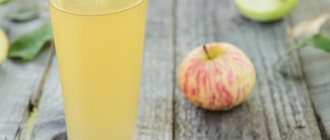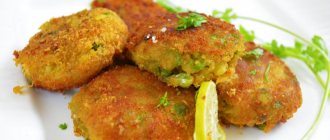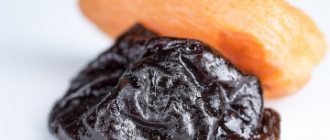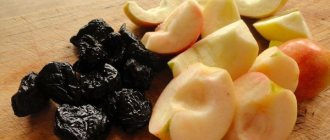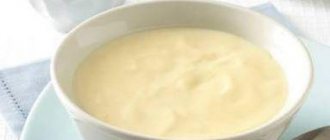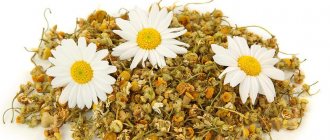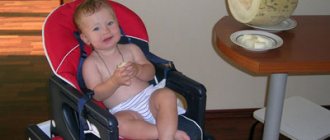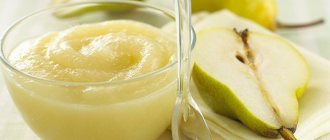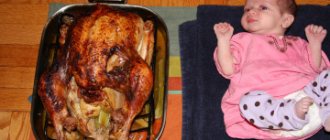How to choose the right product
Before you cook prune compote for your baby, you must choose the right main ingredient so as not to harm the baby.
As you know, prunes are produced from Vengerka (a variety of plums). The times when dried fruits were made naturally by hanging in the shade are long gone. Today, people speed up this process by dipping the plum in a container of sonic soda. After this, cracks form on the peel, due to which the prunes dry out much faster. And to protect the product from pests, it is treated with sulfur dioxide.
Chemically processed foods look better than traditionally dried foods. Therefore, when choosing prunes, you should look for black matte fruits with a pit. The shine of plum, which buyers love so much, is achieved with the help of glycerin or fat of unknown origin, and this will not be beneficial for the baby. If prunes have a smoky taste, this means that they were treated with liquid smoke.
You should carefully select foods for babies. The packaging of truly worthy prunes, which are not harmful to the health of the child, must indicate that they were dried in the traditional way and no chemicals were used in their processing.
Precautionary measures
In addition to useful components, prunes contain a dangerous compound - acrylamide. It is a carcinogen and has neurotoxic effects. If the plums were dried at low temperatures, the amount of this substance will be insignificant. However, its concentration increases when the fruit is exposed to heat. Therefore, prunes should not be eaten regularly.
It is forbidden to exceed the dosage, as this can lead to the development of diarrhea and flatulence. You should not expect an immediate effect: the laxative effect of dried plums develops gradually. During treatment, it is important to ensure that the child drinks enough fluids daily.
At the first sign of an allergic reaction, consumption of prunes should be stopped. After this, you need to give the child an antihistamine. To avoid unwanted consequences, it is better to consult a pediatrician before starting treatment.
Prunes are effective for constipation in a child, but you shouldn’t expect results right away, it’s still not an enema.
Beverages
Depending on the preparation method, prune drinks are divided into categories:
- Decoction. The easiest way to prepare a drink for babies. The decoction is prepared over low heat: you should cook the dried fruits in boiling water for about 10 minutes. In total, for one glass of water you will need to take 3 fruits of each dried fruit, which must first be kept in cold water for about 15 minutes. Before serving to the baby, the drink should be cooled to the required temperature.
- Infusion. A drink with an unsaturated taste contains many useful substances. As in the previous version, the fruits must be cooled in cold water, and then pour boiling water over them and wrap the container well. The drink in this state will cool for about 6 hours, after which it can be given to the baby immediately.
- Prune compote for babies. This drink is the most common because it contains the maximum amount of useful elements. But you should be careful with it, since this option can cause allergic reactions in the child due to the high sugar content. The most interesting recipe is compote of prunes and dried apricots for babies: a couple of glasses of water, a tablespoon of sugar and five fruits of the main ingredients are mixed in a container and then sent to the fire. Boil the drink over low heat for about 15 minutes. This recipe is undoubtedly a favorite among all parents and children, but there are other options besides it. You can get acquainted with them, as well as the beneficial properties of the compote, below.
When can you use the decoction?
If you want to use prune decoction for constipation, then remember that the minimum age when this remedy can be given to a child is 2 months. And the smaller your baby, the less amount of broth he will need - start with no more than half a teaspoon, observing the body’s reaction. Of course, an “overdose” will not cause much harm, but good diarrhea may well cause, as well as an allergic reaction, if the child is predisposed to them.
And if your child is already over 6 months old and is actively trying complementary foods, then you can use not even a decoction, but compotes and prune puree. Although of all these “dishes” the decoction is still the mildest and safest option, it can be given even earlier than the first complementary feeding.
Introduction to diet
You should start giving prune compote for babies in minimal portions: from one teaspoon to 100-150 ml per day. The baby may perceive new foods differently, so his reaction must be monitored carefully. Dried berries and fruits are not to the taste of even some adults, but they can use them forcefully if it is necessary for treatment, but an infant will not do this.
Doctors recommend giving babies a one-component prune compote for babies, the recipe for which is provided below. In this way, you can easily identify allergic reactions to ingredients and individual intolerances of the child. You can enhance the laxative effect with dried apricots or figs, but these components should also be introduced gradually and in small portions.
If the child does not want to drink a drink at all, then you should not force him. Perhaps he is simply not yet ready to consume components unknown to him, from which an incomprehensible odor emanates. Over time, he will still fall in love with compote and it will become his favorite treat. Dried plums have a sourness that is immediately noticeable, but you can easily get rid of it by masking it with honey, syrup or some other dried fruit.
What are the benefits of prune compote?
Using this dried fruit in a baby’s menu allows you to:
- cope with vitamin deficiency
- improve metabolism (due to high fiber content)
- remove toxins and waste from the body
- improve the child’s mood, have a positive effect on the nervous system (it is a natural antioxidant)
- prevent the proliferation of E. coli, salmonella
- strengthen the heart muscle
It is also useful to give such a compote because it has a bactericidal effect, thereby protecting the child’s body from pathogenic infections during epidemics. The properties of this dried fruit are especially appreciated in the prevention and treatment of constipation. Unlike many medications, it can be used during the neonatal period, it is not addictive and can rarely cause allergic reactions.
Compote for constipation
Young parents are accustomed to purchasing a variety of juices and cereals for their babies, but more experienced mothers know for sure that dried fruit compotes are the best for their children. With dried fruits, of course, there will be a little more trouble than with fresh ones, since it will take about half an hour to cook them, but still the effect of such drinks will exceed all expectations.
To prepare the simplest compote for your baby, you only need to take prunes and thoroughly clean them of dust and dirt: pour chilled water over the fruit, hold for about 15 minutes and drain the water. Thanks to this procedure, the debris will sink to the bottom of the container and the product can be safely used without fear for the baby’s health. Once the ingredients are ready, they need to be immersed in a pan of boiling water and cooked for about 25-30 minutes. Then you will need to drain the liquid into a separate clean container and give the compote to your baby from there.
A good option is compote of apples and prunes for an 8-9 month old baby, which is prepared using a thermos. The main ingredients are apples and prunes. They are cleaned in the same way as described above: in cold water. You need to put all the fruits in a thermos, pour exactly a glass of boiling water and leave it for a day. Then you need to pour the contents of the thermos into a separate container, add another glass of boiling water and boil for 10 minutes.
From five months onwards, infants can be given compote made from prunes and dried apricots/raisins. The first ingredient must be cleaned and boiled for 20 minutes, and the rest do not need cooking, because they just need to be poured with boiling water. The infusion of dried apricots or raisins should be left for literally 5-10 minutes, and then combined with boiled prunes and left until the morning.
A universal recipe suitable for children, teenagers and adults is compote of cherries, prunes and black currants. At first glance, this combination may seem strange, but in the end, everyone will like this drink. To prepare, you will need to remove the stems from the berries and rinse thoroughly. The prunes should be cooked for about 25 minutes, and at this time the cherries and currants should be poured with hot syrup and allowed to soak for about 10 minutes. You will need to put this mass in a jar along with the prune decoction and add the syrup again, but this time cold. The drink should be infused for about 20 minutes, after which both adults and children can safely drink it.
What to do if you are allergic to dried fruits
An allergic reaction to a drink can occur at any time. And manifest itself in the form of redness, rash, swelling, itching. The manifestations can be cured using different means: ointments, baths, powders. But neutralizing the cause is possible in only one way - eliminating the allergen. To make it easier to understand which fruit causes a pathogenic reaction, you should try them separately. And after identifying it, remove it from the diet.
If you cannot determine the allergen yourself, you will need to consult a doctor. He will take a blood test and be able to find out what type of dried fruit the reaction occurred to. All that remains is to follow his recommendations for a complete cure for the disease. As a rule, food allergy tendencies with proper nutrition go away by the age of 6 years.
Portions
Children who have weak immunity and other health problems are allowed to give about 5 ml of compote up to one year. The following rules will help cure your baby:
- compote should be given in the first half of the day (before 13 hours), not during breastfeeding, but between them;
- At first, you need to give your baby no more than half a teaspoon of the drink, and then gradually increase the dose to several spoons.
To get the desired effect, you should adhere to the optimal dose. Every parent should know how to cook prune compote for a baby correctly, so as not to harm his health, but only to save him from unnecessary problems. There is no need to force your child to drink a drink if he does not want to. It is quite possible that, for example, at 8-9 o’clock in the morning he will refuse sweet compote, and literally a couple of hours later he will be happy with such a delicacy.
So what's the difference?
A baby who is fed only breast milk rarely suffers from constipation. This is explained by the fact that milk consists of approximately 87% water; in addition, all its components are maximally adapted to children's needs, so they are absorbed easily and quickly.
Any breastfeeding consultant will say that the absence of stool even for up to 5-7 days, if the child does not show signs of discomfort (does not cry, does not strain, the tummy is not tight), is not considered constipation in an infant. Therefore, if you encounter such a “delay”, but the baby behaves as usual, do not rush to take action. Feed the baby on demand, while the mother can eat the plum herself to “relax” the baby’s tummy. And if it’s summer and hot outside, you can gradually give your baby water from a teaspoon to replenish fluid loss.
Another thing is a child on artificial or mixed feeding. Sometimes even an incorrectly selected mixture can cause problems with the gastrointestinal tract. Frequently changing brands of artificial nutrition can also cause constipation. Another risk factor is a lack of fluid, because a child on IV must be supplemented with food (in a day he must drink approximately as much water as he eats formula in one feeding). And of course, no formula is comparable to breast milk in terms of the number of useful substances - milk contains more than 300 of them (and these are only those that have already been discovered and studied), and in artificial nutrition, on average, from 30 to 60 types. Therefore, doctors advise children on IV to introduce complementary foods earlier.
Selection of dried fruits for compote
For compote, you should select local fruits. Dried bananas, pineapples and oranges can be tried later. And in infancy it is better to limit yourself to “local” wealth.
Dried fruits must be ripe (at the time of collection and the start of drying), without external damage (cracks, holes, dimples). Also, you should not buy fruits with stains (this could be fungus or mold). Dried fruits that are too bright and soft should not be taken - most likely, chemicals or preservatives were used in their production. The fruit will need to be sorted before cooking. It is necessary to remove the stalks, twigs and leaves. The rest of the debris will be removed during the soaking process.
It should be remembered that as a result of heat treatment, dried fruits gain moisture and increase in size. Therefore, it is recommended to follow the proportions of the recipe: use 2 liters of water for 0.5 kg of fruit.
In what order should drinks be introduced?
Light compotes are recommended to be introduced into the diet at the age of 6 months
A quarter of a century ago, the World Health Organization established rules according to which a baby should not be given any drink at all in the first four weeks of his life - only mother's milk. Although this product consists of 88% water, its energy value is nevertheless very high.
Breast milk for a baby is not so much a drink as it is food. But after 28 days, the newborn begins to need more fluid. And then we have to solve the issue of new drinks.
The rules here are:
- For the entire first month, the baby is fed exclusively with breast milk; no drinks should be given.
- Over the next month, you can start giving your child water, which must be filtered and boiled.
- In the third month, it is permissible to introduce tea into his diet, which can be prepared from chamomile or fennel.
- Weakly concentrated juices, made first from apples and later from pears or peaches, are introduced from the fourth month.
- When the child is six months old, it is the turn of light compotes.
At what age can you give compote to children?
Young mothers often wonder at what age to give their baby dried fruit compote. The nutrition of each baby should be organized individually, based on a whole set of indicators. Breastfeeding fully covers the baby's fluid and nutritional needs. But in some cases, including an additional source of vitamins is simply necessary.
Compote as an introduction to complementary foods
Of course, in the first 2-3 months you should not give the baby anything other than breast milk or formula. During this period, the child’s body is still adapting to the environment. From milk he gets everything he needs for growth and development. From 3 months, the inclusion of compote in the baby’s diet must be agreed with pediatricians. WHO does not recommend giving extra water to a child under 6 months unless there is a health reason. For example, problems with digestion or stool. After reaching six months, you can already cook compote from 1-2 types of dried fruits (preferably apples and/or pears), without sugar. And as you grow older, diversify your diet with other types of dried fruits.
Compote for night feedings
The rules are approximately the same as with complementary foods. Up to 6 months, a baby can wake up up to 4 times a night (this is normal). And it is better to feed him breast milk or formula, without additional liquids. And from the age of six months, you can completely wean your child off from night feedings. Naturally, this needs to be done gradually, reducing the number of waking ups. And here it is allowed to use compote from dried apples, pears or apricots. Closer to the year, the baby's diet will become so varied that he will no longer disturb his parents at night to replenish his strength. If this does not happen, you should consult your doctor. Perhaps sleep disturbance is due to other reasons (emotional overload in the evening, lack of walks, skipping daytime sleep, etc.).
